Publications
For submission of articles or Working Papers to CEsA, please send an email to:
comunicacao@cesa.iseg.ulisboa.pt
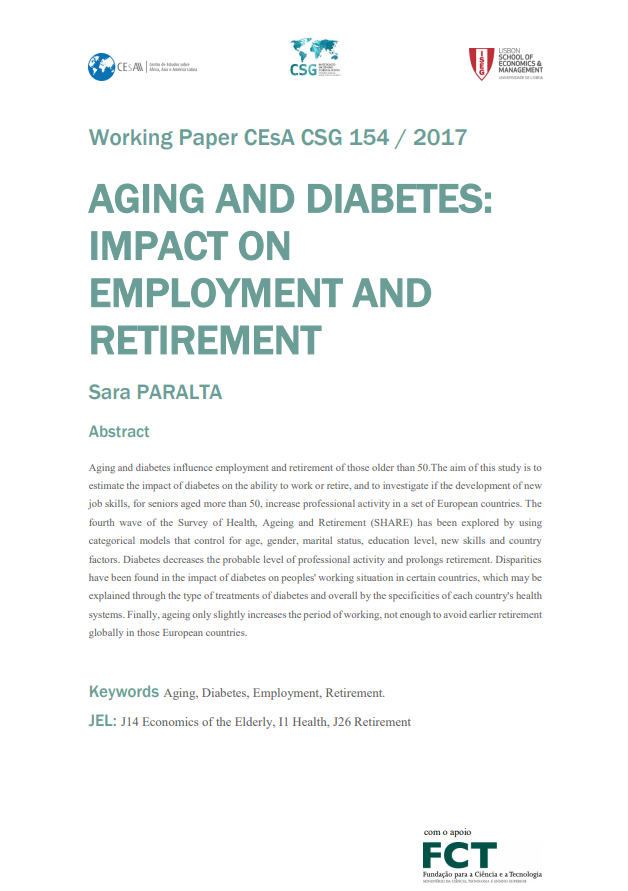
Working Paper 154/2017: Aging and diabetes: impact on employment and retirement
Abstract:
Aging and diabetes influence employment and retirement of those older than 50.The aim of this study is to estimate the impact of diabetes on the ability to work or retire, and to investigate if the development of new job skills, for seniors aged more than 50, increase professional activity in a set of European countries. The fourth wave of the Survey of Health, Ageing and Retirement (SHARE) has been explored by using categorical models that control for age, gender, marital status, education level, new skills and country factors. Diabetes decreases the probable level of professional activity and prolongs retirement. Disparities have been found in the impact of diabetes on peoples’ working situation in certain countries, which may be explained through the type of treatments of diabetes and overall by the specificities of each country’s health systems. Finally, ageing only slightly increases the period of working, not enough to avoid earlier retirement globally in those European countries. The impact of diabetes on professional activity is negative in a set of European Countries included in the inquiry without considering the specific effects of each country. Health problems related with diabetes are causing great economic challenges not only in companies but also in the economy overall. Further investments in education for development new skills and appropriate health treatments of diabetes enhance professional activity. Therefore, those investments are key steps to promote conditions towards active aging and entrepreneurship in senior age.
Quotation:
Paralta, Sara (2017). “Aging and diabetes: impact on employment and retirement”. Instituto Superior de Economia e Gestão – CEsA/ CSG –Documentos de Trabalho nº 154/2017.
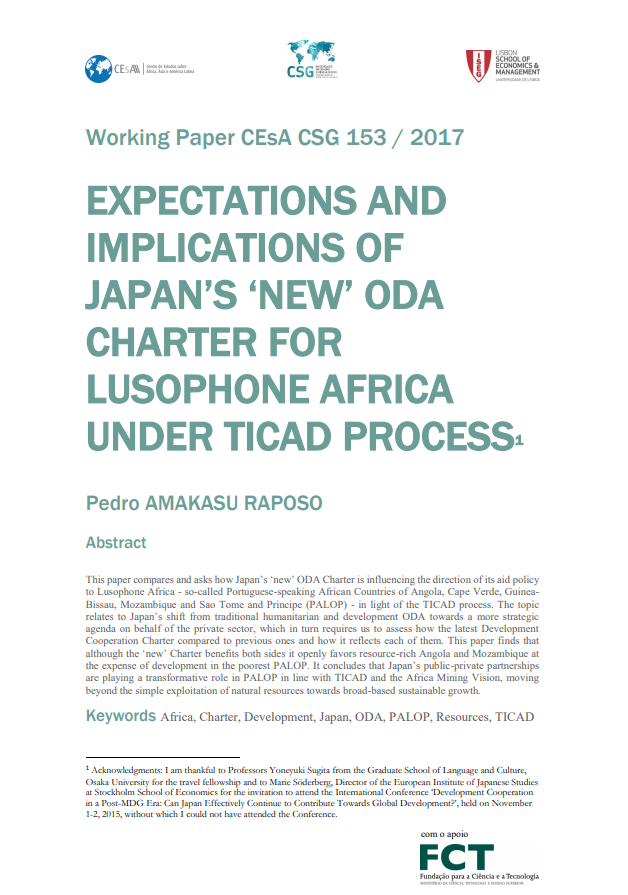
Working Paper 153/2017: Expectations and implications of Japan’s ‘new’ ODA charter for Lusophone Africa under TICAD process
Abstract:
Expectations and implications of Japan’s ‘new’ ODA charter for Lusophone Africa under TICAD process compares and asks how Japan’s ODA Charter is influencing the direction of its aid policy to Lusophone Africa – so-called Portuguese-speaking African Countries of Angola, Cape Verde, Guinea-Bissau, Mozambique and Sao Tome and Principe (PALOP) – in light of the TICAD process. The topic relates to Japan’s shift from traditional humanitarian and development ODA towards a more strategic agenda on behalf of the private sector, which in turn requires us to assess how the latest Development Cooperation Charter compared to previous ones and how it reflects each of them. This paper finds that although the ‘new’ Charter benefits both sides it openly favors resource-rich Angola and Mozambique at the expense of development in the poorest PALOP. It concludes that Japan’s public-private partnerships are playing a transformative role in the PALOP in line with TICAD and the Africa Mining Vision, moving beyond the simple exploitation of natural resources towards broad-based sustainable growth.
Quotation:
Raposo, Pedro Amakasu (2017). “Expectations and implications of Japan’s ‘new’ ODA charter for Lusophone Africa under TICAD process”. Instituto Superior de Economia e Gestão – CEsA (Centro de Estudos sobre África e Desenvolvimento)/CSG Documentos de Trabalho nº 153/2017.
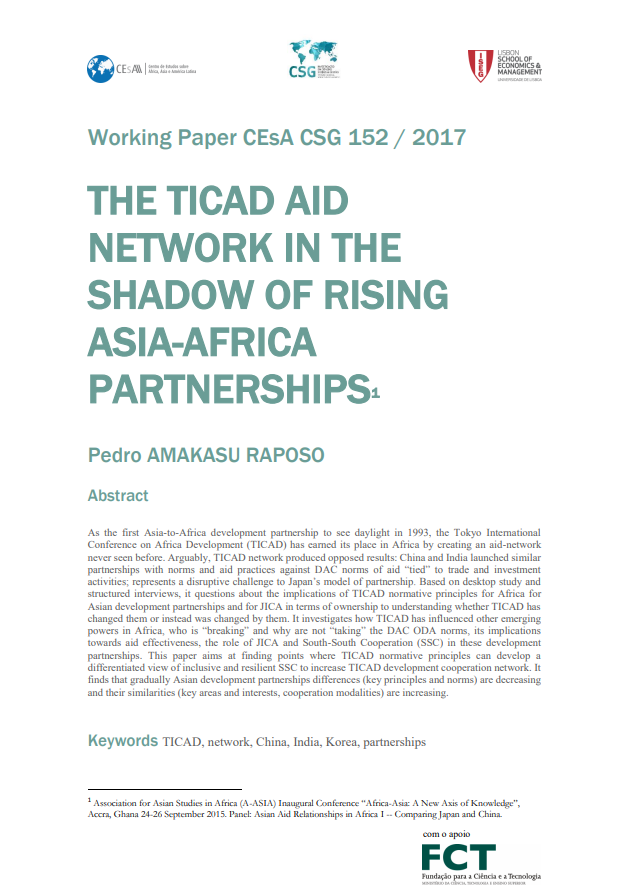
Working Paper 152/2017: The TICAD aid network in the shadow of rising Asia-Africa partnerships
Abstract:
As the first Asia-to-Africa development partnership to see daylight in 1993, the Tokyo International Conference on Africa Development (TICAD) has earned its place in Africa by creating an aid-network never seen before. Arguably, TICAD network produced opposed results: China and India launched similar partnerships with norms and aid practices against DAC norms of aid “tied” to trade and investment activities; represents a disruptive challenge to Japan’s model of partnership. Based on desktop study and structured interviews, it questions about the implications of TICAD normative principles for Africa for Asian development partnerships and for JICA in terms of ownership to understanding whether TICAD has changed them or instead was changed by them. It investigates how TICAD has influenced other emerging powers in Africa, who is “breaking” and why are not “taking” the DAC ODA norms, its implications towards aid effectiveness, the role of JICA and South-South Cooperation (SSC) in these development partnerships. The TICAD aid network in the shadow of rising Asia-Africa partnerships aims at finding points where TICAD normative principles can develop a differentiated view of inclusive and resilient SSC to increase TICAD development cooperation network. It finds that gradually Asian development partnerships differences (key principles and norms) are decreasing and their similarities (key areas and interests, cooperation modalities) are increasing.
Quotation:
Raposo, Pedro Amakasu (2017). “The TICAD aid network in the shadow of rising Asia-Africa partnerships”. Instituto Superior de Economia e Gestão – CEsA/CSG – Documentos de Trabalho nº 152/2017.
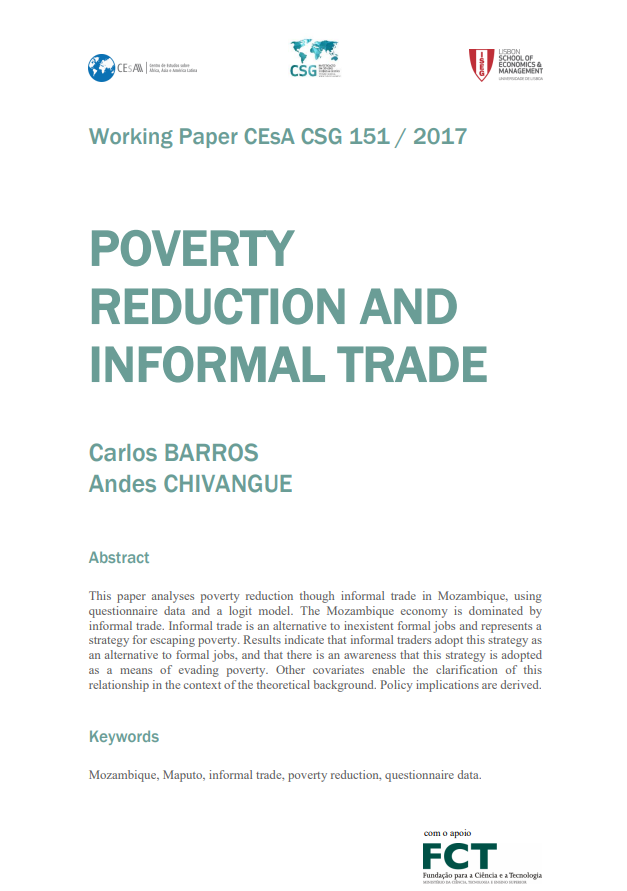
Working Paper 151/2017: Poverty reduction and informal trade
Abstract:
Poverty reduction and informal trade analyzes the relationship between perceptions of poverty and informal trade in Mozambique, based on data from questionnaires conducted in Maputo, the capital of Mozambique, in 2012, adopting a logit model. Research on African poverty is common and generally focuses on microcredit and there is very little emphasis on informal trade, which is so prevalent in Africa. Therefore, this paper contributes to this literature by focusing on informal trade in Mozambique and establishes a relationship between informal trade and perceived poverty. The motivation for this research is threefold. First, although there is a tradition for analyzing poverty in the African context, the relationship between informal trade and poverty perception has not attracted much attention from researchers. This paper thus contributes to the development of the literature and focuses on informal trade in Maputo and also on perceptions of poverty by informal traders. Second, although Lewis’ theory predicts that informal trade workers will later move into the formal sector, this is a long-term issue, and for a specific generation of traders, no transfer is possible due to the low level of education. Therefore, the persistence of informal trade justifies this research. Finally, Mozambique is one of the poorest African countries and no sensible policies against poverty have been adopted, so this informal trade will persist in the future, which is a justification for this research.
Quotation:
Barros, Carlos e Andes Chivangue (2017). “Poverty reduction and informal trade”. Instituto Superior de Economia e Gestão – CEsA/ CSG – Documentos de Trabalho nº 151/2017.
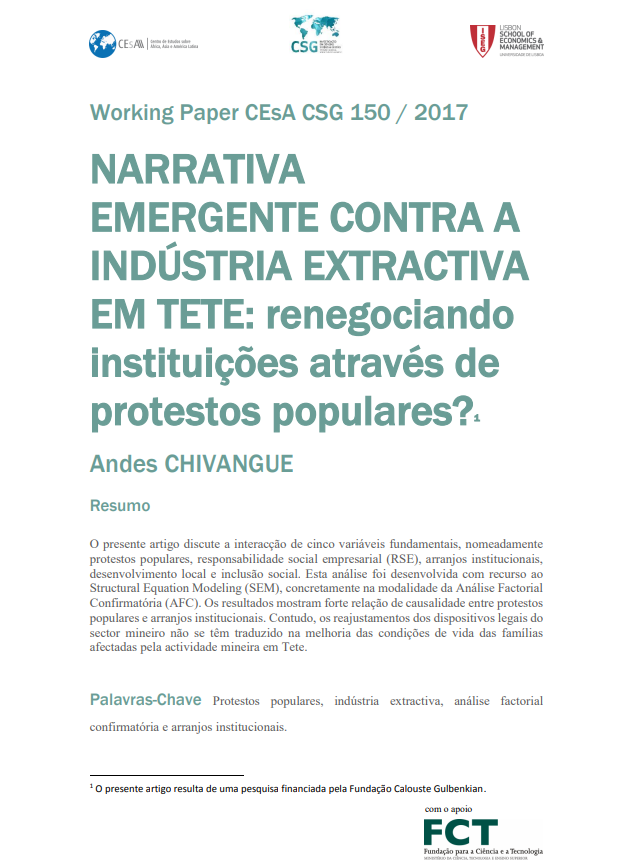
Working Paper 150/2017: Narrativa emergente contra a indústria extractiva em Tete: renegociando instituições através de protestos populares?
Abstract:
In the last 10 years Africa has re-emerged as the epicentre of yet another scrum for natural resources. In fact, the raw materials boom has demobilised the old image of a continent seen internationally as the distant other and, in its place, has spread the narrative of Africa as the new frontier of the business world, where companies from emerging countries – responsible for the valuation of these resources in the international market – have flocked to, as have historically established large companies in the oil, gas and minerals sector. It is in this framework that Mozambique is inserted, known in the academic world and in the development industry as donor darling, whose economic growth and alliance with external donors feeds the idea, considered naïve by many authors, that development can be promoted by attracting flows of Foreign Direct Investment [FDI]. However, the enclave nature of the extractive industry itself, the persistent social inequalities resulting from the failure of economic growth to reduce poverty, the engagement of elites in the business world and the absence of structural transformation put in check this whole diegesis of prosperity and development that the executive and its external allies insist on propagating. Narrativa emergente contra a indústria extractiva em Tete : renegociando instituições através de protestos populares? discusses the interplay of five key variables, namely popular protest, corporate social responsibility (CSR), institutional arrangements, local development and social inclusion. This analysis was developed using Structural Equation Modeling (SEM), specifically in the Confirmatory Factor Analysis (CFA) modality. The results show a strong causal relationship between popular protests and institutional arrangements. However, the readjustments in the legal provisions of the mining sector have not been translated into improved living conditions for families affected by mining activity in Tete.
Quotation:
Chivangue, Andes (2017). “Narrativa emergente contra a indústria extractiva em Tete : renegociando instituições através de protestos populares?”. Instituto Superior de Economia e Gestão – CEsA/ CSG – Documentos de Trabalho nº 150/2017.
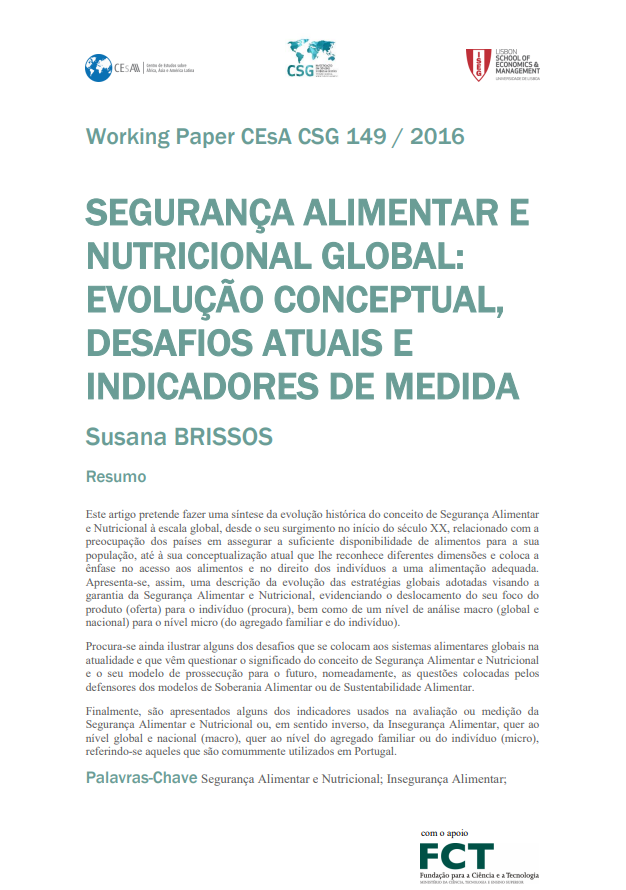
Working Paper 149/2016: Segurança alimentar e nutricional global: evolução conceptual, desafios atuais e indicadores de medida
Abstract:
Segurança alimentar e nutricional global: evolução conceptual, desafios atuais e indicadores de medida summarizes the historical evolution of the concept of Food and Nutrition Security on a global scale, since its emergence in the early 20th century, related to countries’ concern to ensure sufficient food availability for their population, until its current setting which acknowledges different dimensions and puts the emphasis on access to food and the right of individuals to adequate food. It presents a description of the evolution of the global strategies adopted to guarantee Food and Nutrition Security, showing the shift of its focus from the product (supply) to the individual (demand), as well as from the macro (global and national) to the micro level of analysis (household and individual). It also seeks to illustrate some of the challenges facing today’s global food systems and to question the meaning of the concept of Food and Nutrition Security and its model for future pursuit, namely the questions posed by proponents of Food Sovereignty or Food Sustainability. Finally, we present some of the indicators used in the evaluation or measurement of Food and Nutrition Security or, conversely, Food Insecurity, both at the global and national (macro) level, and at the household or individual (micro) level, referring to those that are commonly used in Portugal.
Quotation:
Brissos, Susana (2016). “Segurança alimentar e nutricional global: evolução conceptual, desafios atuais e indicadores de medida”. Instituto Superior de Economia e Gestão – CEsA/CSG Documentos de Trabalho nº 149/2016
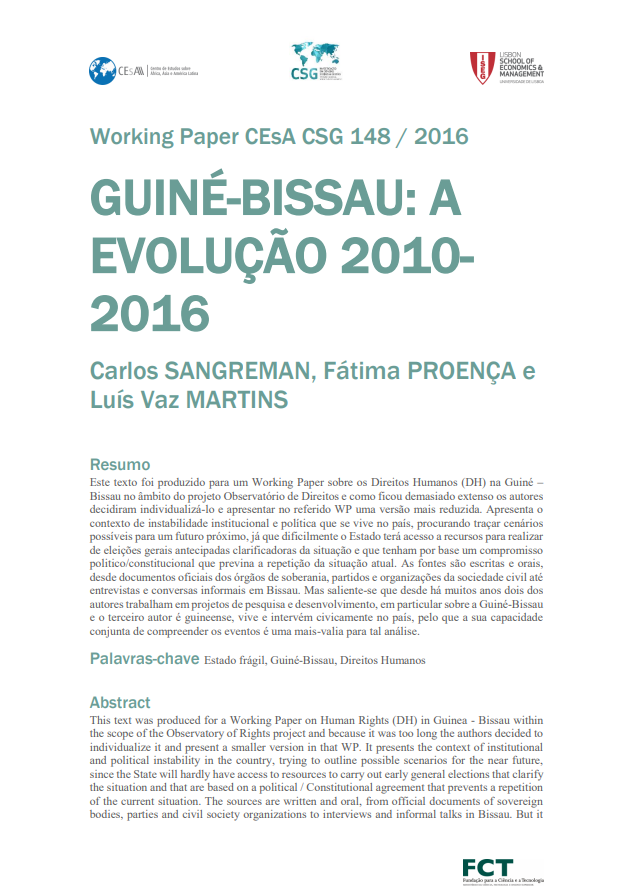
Working Paper 148/2016: Guiné-Bissau: a evolução 2010-2016
Abstract:
Guiné-Bissau: a evolução 2010 – 2016 was produced for a Working Paper on Human Rights (DH) in Guinea – Bissau within the scope of the Observatory of Rights project and because it was too long the authors decided to individualize it and present a smaller version in that WP. It presents the context of institutional and political instability in the country, trying to outline possible scenarios for the near future, since the State will hardly have access to resources to carry out early general elections that clarify the situation and that are based on a political / Constitutional agreement that prevents a repetition of the current situation. The sources are written and oral, from official documents of sovereign bodies, parties and civil society organizations to interviews and informal talks in Bissau. But it should be pointed out that for many years two of the authors have been working on research and development projects, particularly on Guinea-Bissau, and the third author is Guinean, lives and intervenes in the country, for which his joint capacity to understand the is an asset to such an analysis.
Quotation:
Sangreman, Carlos, Fátima Proença e Luíz Vaz Martins (2016). “Guiné-Bissau: a evolução 2010 – 2016”. Instituto Superior de Economia e Gestão – CEsA/ CSG – Documentos de Trabalho nº 148/2016.
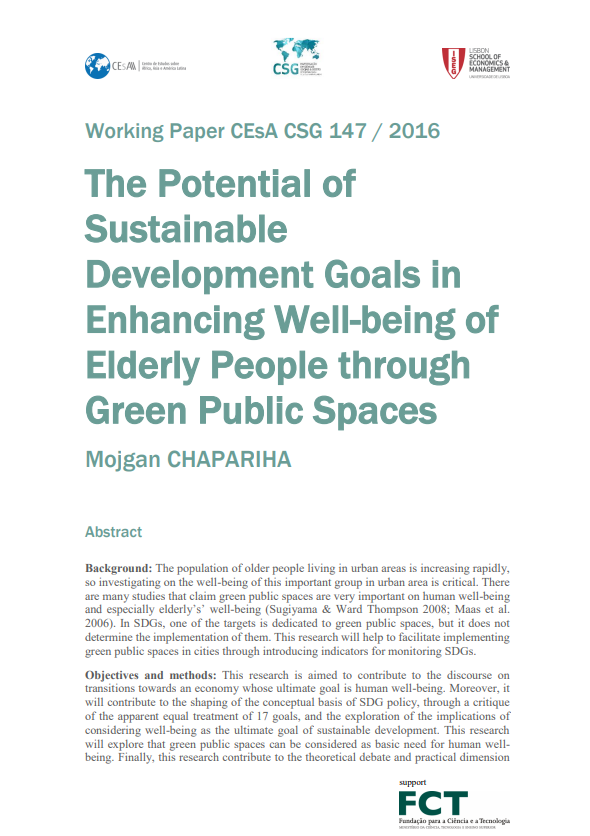
Working Paper 147/2016: The potential of sustainable development goals in enhancing well-being of elderly people through green public spaces
Abstract:
Background: The population of older people living in urban areas is increasing rapidly, so investigating on the well-being of this important group in urban area is critical. There are many studies that claim green public spaces are very important on human well-being and especially elderly’s’ well-being (Sugiyama & Ward Thompson 2008; Maas et al. 2006). In SDGs, one of the targets is dedicated to green public spaces, but it does not determine the implementation of them. The potential of sustainable development goals in enhancing well-being of elderly people through green public spaces will help to facilitate implementing green public spaces in cities through introducing indicators for monitoring SDGs. Objectives and methods: This research is aimed to contribute to the discourse on transitions towards an economy whose ultimate goal is human well-being. Moreover, it will contribute to the shaping of the conceptual basis of SDG policy, through a critique of the apparent equal treatment of 17 goals, and the exploration of the implications of considering well-being as the ultimate goal of sustainable development. This research will explore that green public spaces can be considered as basic need for human well- being. Finally, this research contribute to the theoretical debate and practical dimension of measuring progress towards SDGs, through the more specific case of Green Public Space (GPS) as a target of SDG-11. Results: • Transition towards an economy based on well-being through Herman Daly “ends-means continuum” is crucial for human well-being. • SDG agenda have apparent equal treatment with 17 goals that leads to weak sustainability and finally cannot bring about well-being. • GPS can be considered as basic need for human well-being that is crucial for enhancing elderly peoples’ well-being. • Three indicators introduced to enhance the implementation and monitoring of the GPSs in the context of SDG-11.
Abstract:
Chapariha, Mojgan (2016). “The potential of sustainable development goals in enhancing well-being of elderly people through green public spaces”. Instituto Superior de Economia e Gestão – CEsA/ CSG – Documentos de Trabalho nº 147/2016.
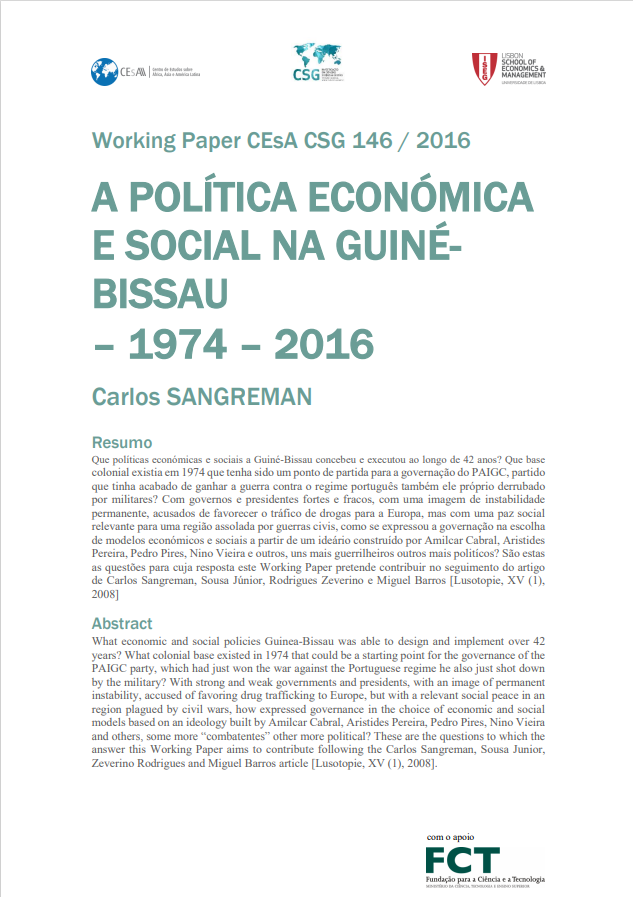
Working Paper 146/2016: A política económica e social na Guiné-Bissau – 1974-2016
Resumo:
The object of analysis of A política económica e social na Guiné-Bissau – 1974 – 2016 are the economic and social policies followed by the different Guinean governments from 1974 to 2016, with a note to the previous colonial period in the 20th century, how they were conceived, approved and put into practice. What economic and social policies did Guinea-Bissau design and implement over 42 years? What colonial base existed in 1974 that was a starting point for the governance of the PAIGC, a party that had just won the war against the Portuguese regime also itself overthrown by the military? With strong and weak governments and presidents, with an image of permanent instability, accused of favouring drug trafficking to Europe, but with a relevant social peace for a region ravaged by civil wars, how did governance express itself in the choice of economic and social models based on an ideology constructed by Amilcar Cabral, Aristides Pereira, Pedro Pires, Nino Vieira and others, some more guerrilla fighters, others more political? These are the questions to whose response this Working Paper intends to contribute following the article by Carlos Sangreman, Sousa Júnior, Rodrigues Zeverino and Miguel Barros [Lusotopie, XV (1),2008].
Citação:
Sangreman, Carlos (2016). “A política económica e social na Guiné-Bissau – 1974 – 2016”. Instituto Superior de Economia e Gestão – CEsA/ CSG – Documentos de Trabalho nº 146/2016.
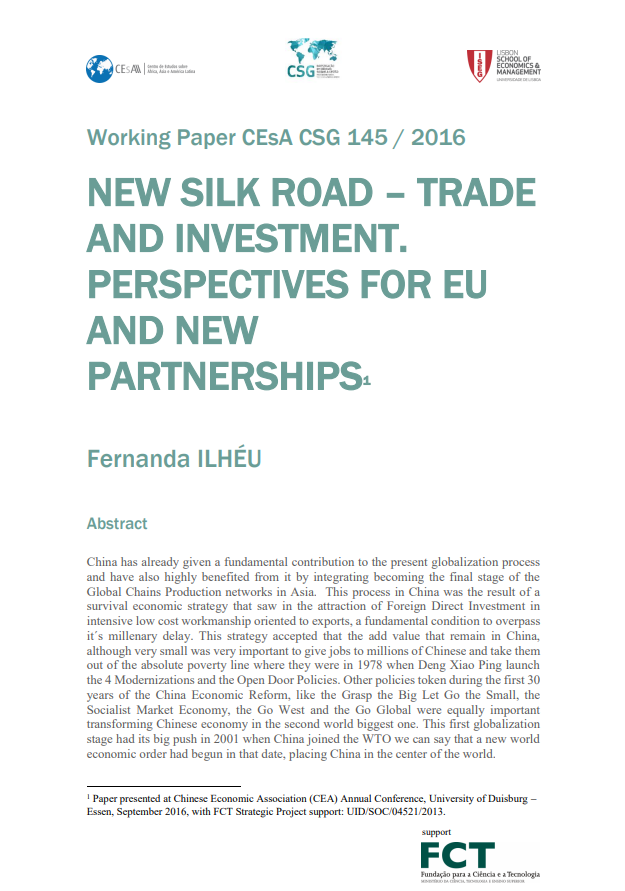
Working Paper 145/2016: New silk road: trade and investment. perspectives for eu and new partnerships
Abstract:
New silk road: trade and investment. perspectives for eu and new partnerships talks about how China has already given a fundamental contribution to the present globalization process and have also highly benefited from it by integrating becoming the final stage of the Global Chains Production networks in Asia. This process in China was the result of a survival economic strategy that saw in the attraction of Foreign Direct Investment in intensive low cost workmanship oriented to exports, a fundamental condition to overpass it´s millenary delay. This strategy accepted that the add value that remain in China, although very small was very important to give jobs to millions of Chinese and take them out of the absolute poverty line where they were in 1978 when Deng Xiao Ping launch the 4 Modernizations and the Open Door Policies. Other policies token during the first 30 years of the China Economic Reform, like the Grasp the Big Let Go the Small, the Socialist Market Economy, the Go West and the Go Global were equally important transforming Chinese economy in the second world biggest one. This first globalization stage had its big push in 2001 when China joined the WTO we can say that a new world economic order had begun in that date, placing China in the center of the world.
Quotation:
Ilhéu, Fernanda (2016). “New silk road: trade and investment. perspectives for eu and new partnerships”. Instituto Superior de Economia e Gestão – CEsA/ CSG –Documentos de Trabalho nº 145/2016





